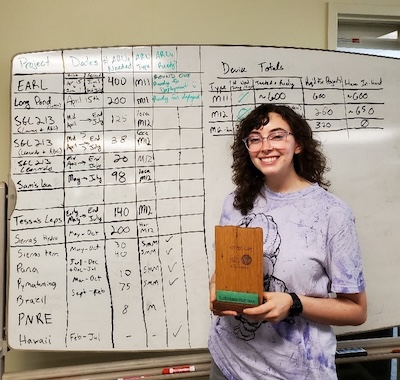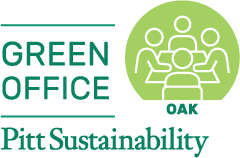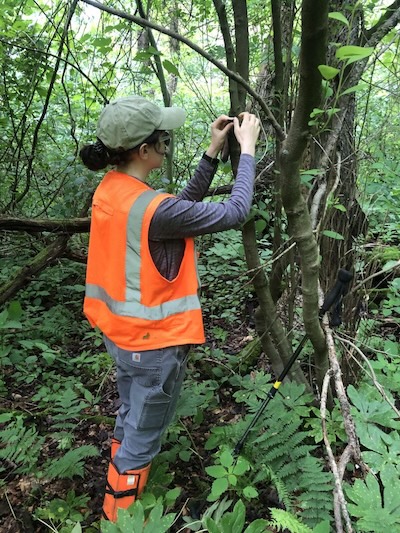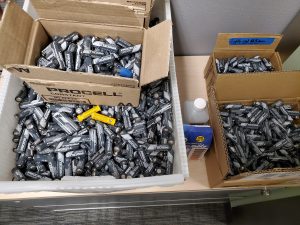The Pitt Green Spotlight is a monthly series highlighting Pitt’s Green Offices & Labs! Each post highlights Pitt Green Offices and/or Labs, sharing their experiences implementing sustainable practices, tips and tricks, lessons learned, and opportunities for more sustainable work at Pitt.
We hope these Pitt Green Offices & Labs will inspire you to try out new sustainable practices in your own workspace! Want to be included in our next highlight? Contact us.
Pitt Green Office Spotlight:
Kitzes Lab Office, Clapp 103, 4249 Fifth Ave


Pitt Green Office Team: Brooke Goodman (pictured), Dr. Justin Kitzes, Cameron Fiss, Tessa Rhinehart, R. Patrick Lyon, Sam Lapp, Louis Freeland-Haynes, Lauren Chronister, Chapin Czarnecki, Hannah Nossan, Santiago Ruiz Guzman, Sasha Syunkova, Leonardo Viotti
Pitt Green Office since March 2020
Led by Assistant Professor Justin Kitzes, the Kitzes Lab uses terrestrial bioacoustics to answer the question, “How are species distributed across complex landscapes, and how do human impacts drive these distributions?” Their research involves placing, monitoring and interpreting data from thousands of small biodiversity sensors that record audio from rare and hard-to-detect species in diverse ecosystems around the state, and the world. The data is used in research related to conservation, natural history, and spatial ecology.

Conducting this research in a manner that minimizes negative human impacts has been a longstanding goal of the lab and its offices, in line with their research question. The Kitzes Lab pursued Green Office designation for the first time in 2020, when the program was initially launched, starting at a “Sprout” designation, and in 2024 grew their efforts up to the top level, earning “Sustainable Oak” designation!
According to Brooke Goodman (pictured), a Research Assistant in the Kitzes Lab, many of the sustainable best practices in their office come down to the culture of sustainability among its 12 staff and many graduate and undergraduate student workers, enabled by Dr. Kitzes. Staff are encouraged to work remotely, and generally take alternative transportation, bike, or walk when they must come into the lab. Resources and equipment, such as printers, refrigerators, and office supplies, are shared versus individually purchased and used. Single-use items such as bottled water and disposable kitchenware are not used in their spaces, and staff opt to bring in their own reusable items.

Still, there are challenges that Brooke and the team encounter for sustainability. Each of the lab’s biodiversity sensors require 3 batteries, adding up to thousands of batteries used. The lab currently recycles spent batteries through Pitt Surplus’ Battery Recycling program but has explored switching to rechargeable batteries and solar-powered units. Cost and logistics have limited these options, but they are open to pursuing alternative sources to power their research.
Brooke also hopes that the University continues and expands its efforts to minimize bird strikes and create safe environments for diverse wildlife from planning, design and construction policies to include existing buildings.
Curious what your lab or office can do to become more sustainable? Reach out to sustainability@pitt.edu to pair up with a Green Ambassador in your area of campus, or for one-on-one consultation to get started!
Thanks to Brooke and the Kitzes Lab team for all their efforts!
